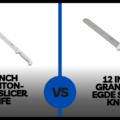Choosing between Shun and Wusthof knives comes down to personal preference, your cooking style, and your budget, as both brands are renowned for their quality and craftsmanship. Shun, a Japanese brand, is known for its lightweight, razor-sharp knives ideal for precise, delicate tasks. On the other hand, Wusthof, a German brand, offers robust, durable knives designed for heavy-duty cutting. Both have their unique features, benefits, and drawbacks. Therefore, understanding their differences can guide you in selecting the brand that best fits your needs in the kitchen.
What Are Shun Knives?
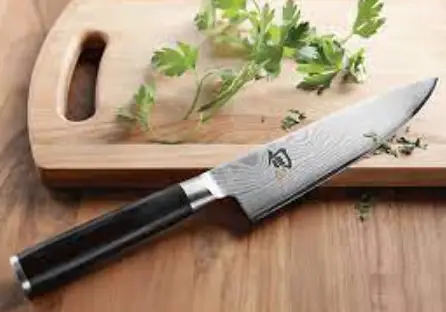
Shun knives are the flagship brand of Kai Corporation, one of Japan’s oldest and most respected knife manufacturers. Established in Seki City over 100 years ago, Shun combines ancient Japanese sword-making techniques with modern technology to create some of the world’s finest cutlery. Each Shun knife is handcrafted and carefully honed to a 16-degree blade angle using high-carbon stainless steel, ensuring superior sharpness, edge retention, and durability. The knives also feature an ergonomic design that makes them easy to handle and use precisely. Each Shun knife is visually stunning with its unique hammered finish and elegant lines.
What Are Wusthof Knives?
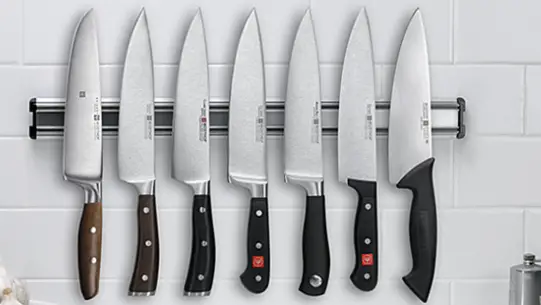
Wusthof knives are created using a unique manufacturing process and materials that ensure long-lasting sharpness with their special curved blades. This iconic German brand has crafted exceptional quality knives for over 200 years. Their current range of knives is particularly well suited to professional chefs, home cooks, and outdoor enthusiasts who enjoy having access to reliable cutlery equipment.
Shun Vs Wusthof Knives
Materials and Construction: Shun knives typically use high-carbon stainless steel, which offers excellent edge retention and sharpness. They also feature a Damascus-style pattern, which results from layering different types of steel, offering a unique and beautiful appearance.
Wusthof knives are made from high-carbon stainless steel, which provides a great balance of sharpness and durability. They undergo a unique tempering process called PEtec, which ensures optimal hardness and edge retention.
Design and Aesthetics: Shun knives are known for their elegant, sleek design that pays homage to traditional Japanese cutlery. They often feature a beautiful Damascus pattern on the blade, and their handles are made from PakkaWood, a durable and water-resistant material.
Wusthof knives boast a more classic, European-style design. They have a full-tang construction, which means the blade extends through the handle for added stability and balance. Their handles are usually made from synthetic materials, like polyoxymethylene (POM), or natural materials, like wood.
Sharpness and Edge Retention: Shun knives are known for their incredibly sharp edges, typically sharpened to a 16-degree angle. This makes them ideal for precise cuts and detailed work. However, their sharpness also means they can be more delicate and prone to chipping if not used properly.
Wusthof knives, sharpened to a 14-degree angle, are still incredibly sharp but offer more durability than Shun knives. Their edges are designed to hold up well under rigorous use, making them ideal for a wide range of tasks in the kitchen.
Knife Variety: Shun offers a wide selection of knives, including chef’s knives, paring knives, utility knives, and specialty knives such as santoku and nakiri. Each knife is designed with a specific purpose, allowing you to choose the perfect tool for your needs.
Wusthof also boasts an extensive range of knives, including classic chef’s, bread, and carving knives. Additionally, they offer several lines of knives, such as the Classic, Ikon, and Gourmet series, each with unique features and design elements.
Price and Value: Shun knives are pricier, reflecting their high-quality materials and craftsmanship. However, many users find the investment worthwhile due to the knives’ exceptional performance and longevity.
Wusthof knives offer a range of price points, depending on your chosen line. While some of their knives are expensive, they offer more budget-friendly options, like the Gourmet series, without compromising quality.
Maintenance and Care: Shun and Wusthof knives require regular maintenance to keep them in peak condition. This includes proper cleaning, honing, and occasional sharpening. Shun knives, with their delicate edges, may require more frequent sharpening and should be handled carefully to avoid chipping. Using a whetstone to sharpen Shun knives is recommended to maintain their optimal performance. Wusthof knives are more forgiving when it comes to maintenance, but keeping them sharp and well-cared for is still essential. You can use a honing steel or a whetstone to sharpen your Wusthof knives.
Warranty and Customer Service: Shun offers a limited lifetime warranty on their knives, covering manufacturing defects and materials. They also provide free sharpening services for the life of the knife, which is a valuable perk for many customers. Wusthof also provides a limited lifetime warranty on their knives. While they don’t offer free sharpening, their customer service is known for being helpful and responsive to any issues that may arise.
Shun Knives Pros And Cons
Pros:
- Exceptional sharpness
- Beautiful design and aesthetics
- Wide range of knife options
- Free sharpening service
Cons:
- Pricier than some alternatives
- Delicate edges may be prone to chipping
Wusthof Knives Pros And Cons
Pros:
- Durable and versatile
- Classic design
- Range of price points
- Suitable for various kitchen tasks
Cons:
- No free sharpening service
FAQs
Can I use a honing steel to sharpen my Shun knives?
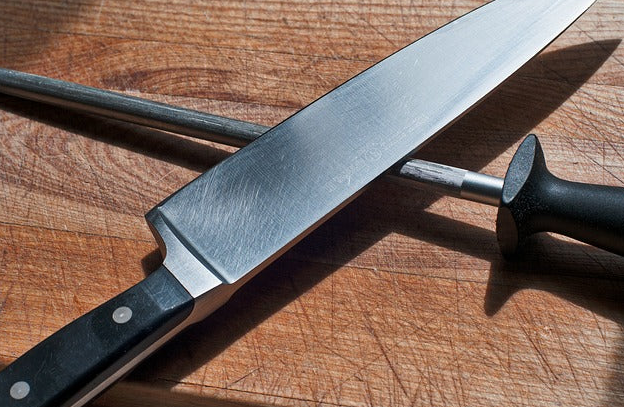
Using a whetstone to sharpen Shun knives is recommended, as it offers more control and precision. However, you can use honing steel for regular maintenance to help maintain the edge between sharpenings.
Are Shun and Wusthof knives dishwasher safe?
While both brands claim their knives are dishwasher safe, it’s always best to hand wash them to prevent damage and maintain their sharpness and longevity.
How often should I sharpen my knives?
The frequency of sharpening depends on how often you use your knives and the specific tasks they are used for. Sharpening your knives every few months or when you notice a decline in their cutting performance is recommended.
What is the difference between honing and sharpening?
Honing realigns the edge of the knife without removing any material, while sharpening removes a small amount of material from the blade to create a new, sharper edge. Regular honing can help maintain your knife’s sharpness, while sharpening is necessary when the edge becomes dull.
Which knife series should I choose from Wusthof?
The best series for you depends on your budget and personal preferences. The Classic series offers high-quality, durable knives with a traditional design, while the Ikon series features a more ergonomic handle and a slightly different blade design. The Gourmet series is a more budget-friendly option but still performs everyday cooking tasks well.
Conclusion
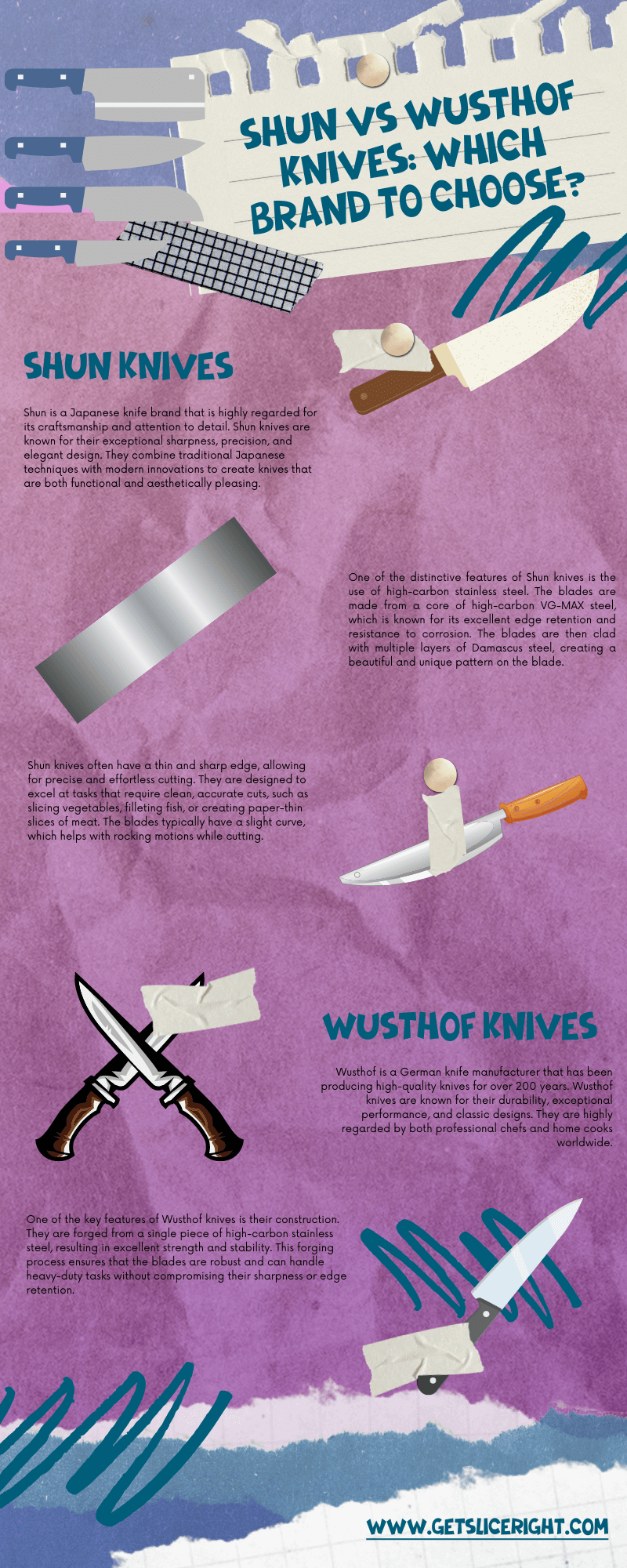
The choice of which brand to purchase depends on user preference. Both brands offer a variety of knives in different styles and materials, so you should be able to find one that meets your needs regardless of what type of knife you are looking for. While Shun knives are more expensive than Wusthof knives, they also offer superior craftsmanship and performance. On the other hand, Wusthof knives provide excellent value for money and durable construction built to last.

Mario Batali is a renowned author, food enthusiast, and passionate chef who has dedicated his life to exploring the world of culinary arts. With a love for sharing his knowledge and experiences, Mario has become a prominent figure in the food blogging community, inspiring countless readers with his creativity and expertise.
In addition to his culinary prowess, Mario Batali is also a talented writer with a flair for engaging storytelling. He launched his own food blog to share his recipes, cooking tips, and personal experiences in the kitchen. Over time, Mario’s blog gained a loyal following of food enthusiasts who appreciate his unique approach to cooking and his dedication to using only the finest ingredients.
Mario Batali’s passion for food and his commitment to sharing his knowledge with others have made him a true inspiration in the world of culinary arts. Through his blog, cookbooks, and public appearances, Mario continues to spread his love of food and the joy of cooking with his ever-growing fanbase.




